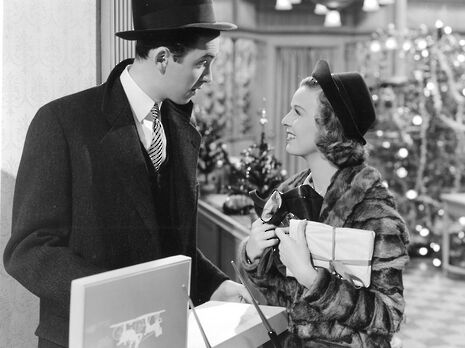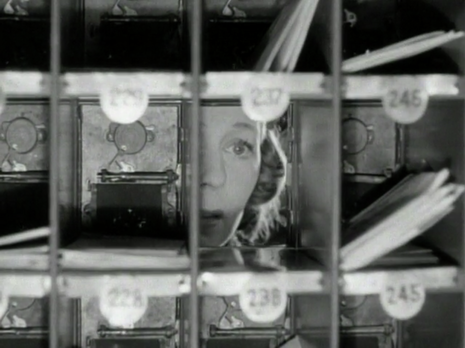My “Dear Friend” The Shop Around The Corner
Film and TV Editor Madeleine Pulman-Jones tells you why this Hollywood classic should be your new essential Christmas movie

On a wintry night at a Budapest café, having unceremoniously quizzed her about her absent date and copy of Anna Karenina, Alfred Kralik suggests to Klara Novak, “There might be a lot we don’t know about each other. You know, people seldom go to the trouble of scratching the surface of things to find the inner truth.” To this she sharply replies, “Well I really wouldn’t care to scratch your surface, Mr Kralik, because I know exactly what I’d find. Instead of a heart, a handbag. Instead of a soul, a suitcase. And instead of an intellect, a cigarette lighter… which doesn’t work.” Baffled, Kralik just manages to reply, “Well that’s very nicely put… that’s a very interesting mixture of… poetry and… meanness.”
In Mr Matuschek’s leather goods shop, everything in life seems to have been neatly catalogued and shelved. From the cigarette boxes that play ‘Ochi Chërnye’, to the big black suitcases in the back room, things are put in their proper place and are sold for their proper price. When Mr Matuschek (Frank Morgan) hires Klara Novak (Margaret Sullavan), a bright young woman looking for work, the antagonism between her and his idealistic head salesman, Alfred Kralik (James Stewart), threatens to throw his shop, and all their lives into chaos.
Unbeknownst to each other, Alfred and Klara become involved in a romantic correspondence after he replies to her anonymous ad in the local paper. Still knowing each other only as “Dear Friend”, the two arrange to meet. On the night of their date while working late on a Christmas display, Kralik is fired by a jealous Matuschek who wrongly suspects him of having an affair with his wife. When Kralik goes to meet his pen-pal at a café, he discovers that it is none other than Klara. How could the woman with whom he has been bickering for the last six months have written such moving letters about art, literature, and love? Could he have been fighting with Klara all that time because he loved her?
Somewhere in backlot Hollywood Budapest in 1940, one of the greatest ensemble casts in history gathered under the wing of comedic master Ernst Lubitsch to make The Shop Around the Corner, one of the most delicious Christmas films. To be necessarily reductive, Lubitsch, who moved to Hollywood in 1922 after a wildly successful career as a silent film director in Germany, made some of the most intelligent comedies of the 1930s and ‘40s, among them Trouble in Paradise, Ninotchka, and To Be or Not to Be.

The film was remade as the 1949 musical In the Good Old Summertime with Judy Garland in Sullavan’s role, the 1963 Broadway musical She Loves Me, and finally in 1998 by Nora Ephron as You’ve Got Mail, starring Tom Hanks and Meg Ryan. None of these remakes live up to the eccentric hilarity of Lubitsch’s original. At once a light romantic comedy and a moving portrayal of ‘30s Hungary that has a lot to say about post-depression America, The Shop Around the Corner is full of humorous exchanges, slapstick moments, and subtle political commentary – all undoubtable examples of what has come to be known as “the Lubitsch touch”.
Though all the Lubitsch comedies are romantic and tender, particularly my personal favourite, Ninotchka, The Shop Around the Corner is particularly delicate. Tragedy hangs from the film’s edges like icicles from the shop window – Matuschek’s discovery of his wife’s infidelities, Kralik losing his job, Klara’s bout of depression. Throughout, one feels as though the comedic ice on which the actors are skating is uncommonly thin – the cold waters of despair closer at hand than one might think. The witty repartee allows, as in the best early Hollywood comedies, for an exciting representation not only of romance, but of women equal to or more intelligent than their male counterparts. I agree with film critic David Thompson, who wrote that Kralik and Klara are “too in love with love to fall tidily into each other’s arms,” but it’s just this messiness which lends the film its charm.
One of the magical things about The Shop Around the Corner is its uniformly superb supporting cast. To watch the film once is to watch it as a romance framed by an ensemble of characters, to watch it again is to marvel at the artistry of this frame. Each time I revisit The Shop Around the Corner, I am stunned by a different supporting performance. Upon my last viewing, I was touched and surprised by the quiet sadness and positivity of Sara Haden as Flora, one of Matuschek’s long-suffering clerks. My grandmother, herself an actress, often talks of how she considers Joseph Schildkraut’s performance as the slimy Vadas one of the most articulate and well-observed character studies she has ever seen.
What distinguishes Lubitsch’s craftsmanship across his oeuvre is his unshakable instinct for cinematic moments. The shot through the post office box when Klara doesn’t receive a letter from her “Dear Friend” is utterly devastating. At first, her hand searches the sides of the box before it flops down, realising there is no letter. Not satisfied, Klara crouches down to look inside just to be sure – so distraught is she at the thought that he might have forgotten her. Through the tiny letterbox we can only just catch her searching eyes, her quivering lip – it’s an intensely cinematic image that many other directors would have missed, happy with the gimmick of the hand in the letterbox, unaware of the possibility of this final emotional gut-punch.
I’ve seen this film touted as a James Stewart Christmas alternative to It’s A Wonderful Life, but it deserves a more important place in our festive movie libraries than that. Watch The Shop Around the Corner for its tender love story and priceless character performances from the likes of Felix Bressart (one of the kindest faces in Cinema), Joseph Schildkraut and Frank Morgan. The Shop Around the Corner has been my own “Dear Friend” at Christmas for a long time – this year make it yours too
 News / Cambridge academics sign open letter criticising research funding changes22 February 2026
News / Cambridge academics sign open letter criticising research funding changes22 February 2026 News / Supporters protest potential vet school closure22 February 2026
News / Supporters protest potential vet school closure22 February 2026 News / University Council rescinds University Centre membership20 February 2026
News / University Council rescinds University Centre membership20 February 2026 News / Hundreds of Cambridge academics demand vote on fate of vet course20 February 2026
News / Hundreds of Cambridge academics demand vote on fate of vet course20 February 2026 Comment / A tongue-in-cheek petition for gowned exams at Cambridge 21 February 2026
Comment / A tongue-in-cheek petition for gowned exams at Cambridge 21 February 2026









